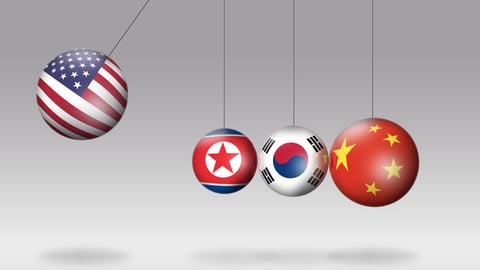Growing Global Insecurity
Security is a deep-seated human need. Insecurity spawns discontent and fears, which can empower strong and even dictatorial leaders. Where will the cycle of insecurity end?

The world has moved closer—much too close—to the brink of major interstate war. We need [to take] steps away from the brink!”
So said Wolfgang Ischinger, chairman of the Munich Security Conference. February’s conference addressed security concerns from every corner of the globe, with special emphasis on Europe and the Middle East.
A spiral of insecurity
The Conference website gave this background:
“For international security, the year 2017 was marked—among others—by signs of a continued erosion of the so-called liberal international order and an increasingly unpredictable US foreign policy. Tensions in many parts of the world have been growing: the rhetoric between the US and North Korea has escalated, the rift in the Gulf has deepened, not only between Saudi Arabia and Iran, and major arms control treaties are at stake. In the last year, the world got closer—much too close—to the brink of significant conflict, and the international community must do whatever it can to move away from the brink.”
The Western democracies in general have been ill-prepared for the growing dangers and the discontent of many of their citizens.
Coming after the post–Cold War era of optimism and peace dividends, the current level of insecurity has been a shock to the world system. The Western democracies in general have been ill-prepared for the growing dangers and the discontent of many of their citizens.
Chrystia Freeland, Canadian minister of Foreign Affairs, said, “International relationships that had seemed immutable for 70 years are being called into question. From Europe, to Asia, to our own North American home, long-standing pacts that have formed the bedrock of our security and prosperity for generations are being tested.”
With the United States turning increasingly inward and away from the leadership role it has played since World War II, some have proclaimed the end of pax Americana—the peace guaranteed by U.S. military and economic hegemony. Many other nations are rushing to try to fill the void left by the U.S., but this has only turned the vacuum into a vortex.
Economic insecurity
Worry about jobs and money can affect even fairly wealthy countries, such as members of the European Union. The World Bank warned the EU of the dangers of its growing income inequality, where the earnings of the poorest 10 percent fell by 7 percent in recent decades, while the earnings of the wealthiest 10 percent grew by 66 percent.
Kristalina Georgieva, the World Bank chief executive and a former EU commissioner, said, “If left unattended, the risk is right there that people feel disenfranchised, disillusioned, and left behind. … There will be fertile ground for populism—not necessarily for [politicians] who come up with solutions, but people who come up with the right slogan.”
Seeking security in strong leaders
Insecurity is felt by citizens in many different ways. For some, unemployment hits home. Others fear crime and violence in their neighborhoods. Others react to an influx of immigrants or changing societal values. Lack of hope for economic advancement and fear of national enemies can all lead to worry, anger and insecurity.
When facing crises, the human impulse is often to seek strong leadership.
In his article “How Dictators Come to Power in a Democracy,” Jim Powell explained the rise of Adolf Hitler in Germany:
When facing crises, the human impulse is often to seek strong leadership.
“The short answer is that bad policies caused economic, military and political crises—chow time for tyrants. German circumstances changed for the worse, and when people become angry enough or desperate enough, sometimes they’ll support crazies who would never attract a crowd in normal circumstances.”
Though Hitler is an extreme case, today’s crop of strongmen often ride on similar waves of crisis. They often promise security in an insecure world.
In Russia, newly reelected Vladimir Putin epitomizes strength and a revitalized Russia to a struggling but proud people. In China, removing President Xi’s term limits is seen as guaranteeing continued stability and power to a nation that believes it has long been denied its rightful place on the world stage. And on it goes.
The flux in divided democracies like Italy can leave citizens wishing for stability. And while the European Union is still seen by many as the last best hope for preventing a repeat of Europe’s bloody history, many others have grown frustrated by its complex bureaucracy.
Some contemporary challenges
Those challenges are coming in new and more destructive forms.
European Commission President Jean-Claude Juncker said in his most recent State of the Union speech, “Cyber-attacks can be more dangerous to the stability of democracies and economies than guns and tanks.”
Bible prophecy indicates Europe will unite behind a strong leader in the tumultuous end time. Read more about this in our article “Where Are We Now in Bible Prophecy?”
Humanity’s ability to unleash the powers of the universe have far outstripped our ability to control ourselves. Scientist Stephen Hawking, who died March 14, shared his thoughts on the human condition in the Independent: “The human failing I would most like to correct is aggression. … It threatens to destroy us all.”
Ultimately, the solution to our insecurities cannot be to rally behind the strongest tyrant who will build the most powerful army to defeat all enemies. It’s been tried too many times and ultimately always fails. If we continue down this road, soon our weapons of mass destruction will guarantee no survivors.
So what is the only real solution—the only source of true security?
Our loving, Almighty God can protect and care for us now, in these end times, and He promises to save humanity from self-destruction (Matthew 24:22). The answer to this world’s insecurity is the return of Jesus Christ to establish the Kingdom of God.
Date Posted: April 13, 2018



